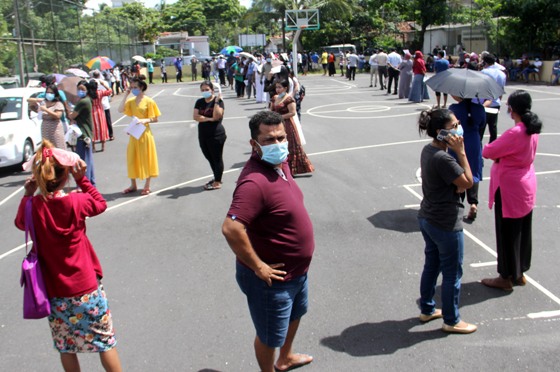Covid deaths may reach unprecedented levels
SLMA warns of grave national catastrophe, calls for rapid action plan to reduce COVID-19 caseload
COLOMBO – A team of medical specialists on Monday (10) called for a rapid action plan to reduce the COVID-19 caseload, warning Covid deaths may reach unprecedented levels and a grave national catastrophe was a real potential threat in the near future, unless something that offers rapid results is implemented.
The alarm bell was sounded when a team of six specialists from the Sri Lanka Medical Association (SLMA) and its Intercollegiate Committee (SMIC) with expertise in prevention and management of COVID-19 infection, met President Gotabaya Rajapaksa on Monday.
SLMA in a statement issued on Tuesday (11) about the meeting, said the team of specialists had brought to the president’s attention the urgency of the situation, where the number of cases of COVID-19 was rapidly and exponentially rising and the number needing ICU care, as well as deaths related to COVID-19, was speedily escalating.
“The healthcare resources are being overwhelmed, as indicated by the rapid increase in utilization of all health sector beds and healthcare facilities by COVID-19 patients and the number requiring oxygen and the number waiting for Intensive Care Unit (ICU) management is rapidly rising,” the team had told the President, noting there was a severe shortage of PCR facilities, particularly in peripheral hospitals and diagnosed COVID infected individuals were languishing at home, awaiting admission to hospitals or intermediate centres.
The specialists had warned that unless a rapid action plan to reduce the case load is implemented; the health care system will inevitably go out of control and end up in a total breakdown.
They had also highlighted the fact that facilities for Non-Covid medical problems are being curtailed through necessity and their management was getting neglected, leading to an unavoidable increase in deaths of patients with Non Covid diseases.
While appreciating the efforts taken by the President to expand the facilities for care of COVID-19 patients by providing beds, ICU beds and oxygen supplies, the team had highlighted the disturbing possibility of physical and mental fatigue of healthcare professionals and that quick action was essential to curtail the rapid rise of cases to avert a collapse of the healthcare system.
Highlighting the lag-time of two weeks from the time of infection to develop symptoms and another two weeks for the need for ICU care and even death, the specialists had explained the death rate seen today was the result of infection contracted one month ago, and based on that perception, it was likely there will be more and more cases and deaths over the next 3 -4 weeks.
Calling for action to be instituted immediately, they had warned there will be an exponential rise of cases followed by a surge, at which time interventions of any sort was unlikely to have any significant impact on the outbreak, “In this scenario, a virtual breakdown of the health care system would be unavoidable and perhaps inevitable.”
The specialists had also told the President that locking down smaller areas such as Gramaseva Divisions were unlikely to be effective in controlling the spread of infection, as the UK variant of COVID-19 (prevalent in Sri Lanka) is highly transmissible and infectious, and the delay in getting PCR reports meant infected patients had already spread the disease to a larger community in society.
Acknowledging that a rapid mass vaccination program was the solution for the Covid outbreak in the long-term, they had however pointed out vaccines with two doses take a minimum of 6 – 8 weeks to develop an effective immune status, and as such, it was not the only or the best solution for the immediate crisis in hand.
The need of the hour is something that offers urgent results of reducing the caseload, they had urged, warning Covid deaths may reach unprecedented levels and a grave national catastrophe is a real potential threat in the near future unless something that offers rapid results is implemented.
Calling for strict and immediate measures to restrict movement of people as the only measure that quickly and drastically reduces the numbers of cases, they had explained achieving rapid control would save many lives, ease the burden on hospitals, lay the background for vaccination and be economically beneficial in the longer-term.
The statement noted that the request for very stringent implementation of the Extraordinary Government Gazette notification on controlling COVID-19, published in October 2020 with selected lockdown processes of certain areas such as districts and even provinces, based only on scientific evidence of the density of caseloads, together with restriction of inter-district and interprovincial movement of people was well taken up by the President, for early implementation. Request to authorize isolation of families at homes, along with home management of asymptomatic cases, while being carefully and assiduously monitored by health care professionals was also well received, the statement said.
The six specialists who met the President included Dr. Padma Gunaratne, Consultant Neurologist and President, SLMA; Professor Jennifer Perera, Consultant Microbiologist and Past President, SLMA; Dr. Manilka Sumanatilleke, Consultant Endocrinologist and Vice President, SLMA; Dr. Harsha Sathischandra, Consultant Physician and President, College of Internal Medicine; Prof Thamasi Makuloluwa, Consultant Anaesthesiologist and President, College of Anaesthesiologists; and Dr Ruwan Ferdinando, Consultant Community Physician (Planning), National Institute of Health Sciences, Kalutara.
-ENCL


